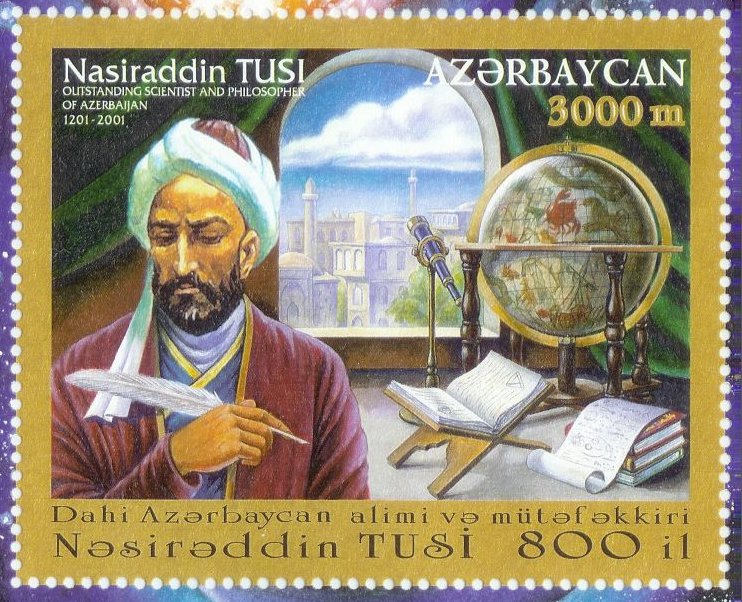Scientists Who Made a Difference
Nasir al-Din Tusi
(1201-1274)
and the Maragha Observatory

In 1253 AD, the Mongols began their invasion in Persia and the Caucasus. As strange as it may sound, for Nasir al-Din Tusi, it was a case of being in the right place at the right time, although that place happened to be prison where he had been held captive for many years by the Assassins, a religious terrorist group. The Mongolian occupation led to his release.
In the end, it was, allegedly, Tusi who persuaded the Hulegu Khan (Hulaku Khan) to continue his attack on Baghdad and destroy the Abbasid Caliphate there. The Khan succeeded in 1258 and afterwards made Tusi one of his personal advisers.
Hulegu then made Azerbaijan the center of his huge state which was known as Mongolian Ilhanid Dynasty (in Azerbaijani, "People's Khans"). Maragha, an ancient cultural center became the first capital. Later on, it was changed to Tabriz.
Part of the Maragha Observatory Complex that still stands today.
Rationale for the Observatory
It was then that Tusi, being a scientist, persuaded the Khan to build an observatory in Maragha. "And why do we need an observatory?" the Khan reportedly asked Tusi, when he proposed such an expensive undertaking. "Is the science about the stars so important that we should spend such a great amount of money?"
Then Tusi replied, "Allow me to carry out an experiment. Let's arrange for someone secretly to go up this mountain and cast down a large empty caldron." And so they did. When the caldron came tumbling down, it produced such a terrible noise that the Khan's soldiers panicked.
Then Tusi remarked, "We know the reason for this entire clamor, that's why. And so it is, if we know the secrets of the celestial phenomena, we will be calm on the Earth." This incident was recorded by the well-known historian, Haji Halifa, in his work, "A Book about the World."
The Khan agreed and allocated 2,000 dinars for the construction of an Observatory which would be the largest in the East. Construction began in 1259 and was carried out primarily by M Urdi and his son, Mahmud.
A star globe from the Observatory in Maragha made in 1279 and now preserved in Dresden, Germany. It is a rare example decorative art from Azerbaijan of the 13th century, designed by M. Ordi and made of bronze, inlaid with silver and gold.
The Observatory later provided a model for a similar building in Peking. It was known to have housed an exceptionally large library and a school for training specialists.
Tusi gathered renowned scientists to be involved with the construction of the instruments as well as actual observations. Many other nationalities, in addition to Azerbaijanis, were involved with the work including the Chinese astronomers, Georgians, Mongolians, Turks, Persians, Arabs, Jews, and others.
Tusi, the Scholar
Tusi was a man of exceptionally broad knowledge. He was born in 1201 in Tus in the Khorasan Province near the city of Mashad (Persia at the time, now Iran). He became quite influential in the East and wrote an enormous corpus of more than 100 works in Arabic and Persian. Many of his works provide a well-consolidated account of what others had previously accomplished. Many became the standard in a number of disciplines up until modern times.
An architect's rendition of the Maragha Observatory that was built in 1258 in Eastern Azerbaijan Province in Iran.
But Tusi also made substantial contributions to knowledge himself. Most of the contemporary researchers consider him first of all a mathematician. His works played a great role in the development of geometry and trigonometry not only in the East but also in Europe.
It was Tusi who presented trigonometry as an individual science for the first time in the world.
Nasir al-Din was one of the greatest scientists, philosophers, mathematicians, astronomers, theologians and physicians of the time and was a prolific writer. He made significant contributions to a large number of subjects, and it is indeed difficult to present his work in a few words. He wrote one or several treatises on different sciences and subjects including those on geometry, algebra, arithmetic, trigonometry, medicine, metaphysics, logic, ethics and theology. In addition he wrote poetry in Persian.
The list of his known treatises is exhaustive; Brockelmann lists 56 and Sarton 64. About one-fourth of these concern mathematics, another fourth astronomy, another fourth philosophy and religion, and the remainder other subjects. The books, though originally written in Arabic and Persian, were translated into Latin and other European languages in the Middle Ages and several of these have been printed.
Tusi's influence has been significant in the development of science, notably in mathematics and astronomy. His books were widely consulted for centuries and he has been held in high repute for his rich contributions.
He improved upon earlier Arabic translations of Avicenna (Canon of Medicine), Euclid (Elements), Ptolemy (Almagest), and Autolycus, Theodosius, Apollonius and others.
About 20 works of his works make contributions to the fields of mathematics and astronomy. The most famous is "The Astronomic Tables of Ilhans" in four volumes which is a compilation of the research carried out at the Maragha Observatory. His most popular book dealt with ethics, "Ahlagi Nasiri."
Tusi died on June 25, 1274, in Baghdad. The calligraphic inscription on his grave reads:
"The helper of religion and people, the Shah of the country of Science-such a son had never before been born."
Today, the memory of Nasir al-Din Tusi is highly revered and honored in the Republic of Azerbaijan. Many institutions have been named after him including the National Pedagogical Institute in Baku and the Observatory at Shemakha.
See also: “Mistaken Western Pride”
By Rania El Saadawy